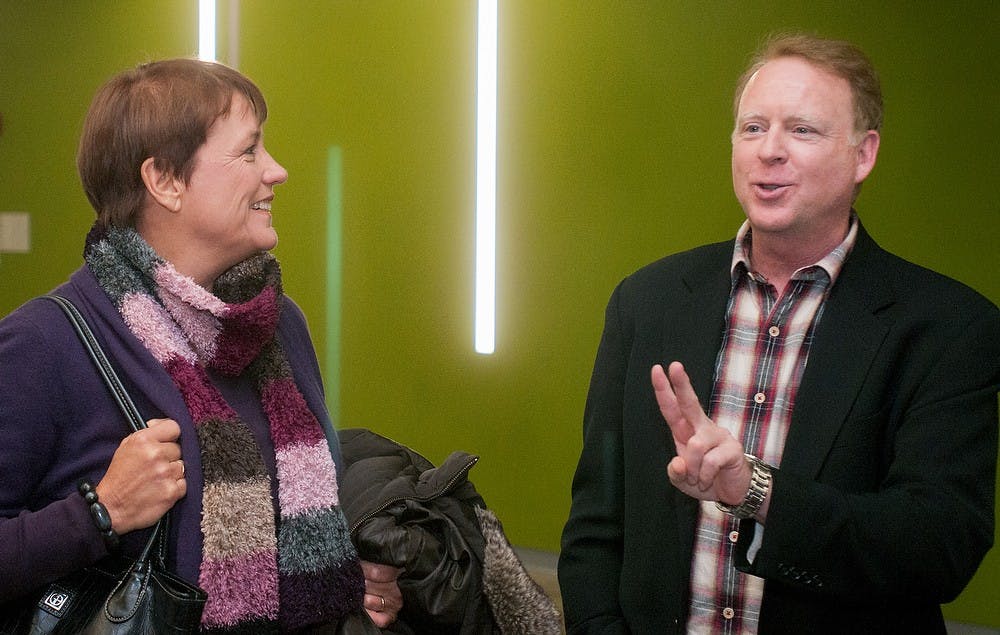It has been 60 years since legendary actor and MSU alumnus James Caan came to MSU to play football and study economics.
The former Spartan studied and played as a “tackling dummy” for only a year before he left for New York to pursue his career in acting.
Through the years, Caan went on to star in a myriad of films, from a submarine commander in the 1968 film ”Submarine X-1” to his Academy Award nominated performance as Sonny Corleone in ”The Godfather.”
And it is through the years that Michigan State has nurtured and become intertwined with the moving image, growing at the same time as a university and a place where students can come to learn and fulfill a passion for all things film.
This growth is perhaps most exemplified in a newly created major in film studies, fresh out of the blocks as of January 2015.
“The degree we’re offering to students, we think, is really strong, both in terms of getting students to think critically and creatively about what film is and what it could be and what it has been,” Joshua Yumibe, director of film studies at MSU and the creative force behind the new program, said.
Yumibe said one of the focal points of the program is its collaborative effort across the colleges of MSU, namely between the College of Arts and Letters and the College of Communication Arts and Sciences.
“We do a lot of collaborative programs with Communication Arts and Sciences,” Yumibe said. “We share a couple minors in filmmaking, specifically in fiction filmmaking and documentary production.”
The director said when it comes to the students of the collaborative program, he is nothing short of impressed.
“The students that we have coming through all of these degrees — both the Communication Arts and Sciences and also Arts and Letters — the students have been fantastic.”
This collaboration has led to student efforts in films such as “Blacktop,” a film centered around a paramedic who fails to save the life of a shooting victim in a troubled town.
“Blacktop” delves into sensitive issues, such as race relations and police brutality, and sources actors from around the Lansing area.
Passion for films and filmmaking is not solely limited to those pursuing education in the colleges of Arts and Letters or Communication Arts and Sciences.
Sam Raimi, perhaps the MSU alumnus to find the most success in the filmmaking business, attended MSU in 1978. Raimi majored in English, and although he left after only three semesters, he did so with good reason — to direct one of the most acclaimed cult horror series of all time: “The Evil Dead.”
Raimi may have left after only a short time, but before parting he instilled himself forever in the memory of the university by helping found the MSU Filmmakers Club, which still thrives to this day.
“The MSU Filmmakers Club is essentially a big collaborative group of writers, actors, producers, sound/camera/light operators. Its members are all very passionate about films and filmmaking,” Emma Leitz, the club’s head of public relations and social media, said.
Leitz explained MSU Filmmakers Club appeals to all majors “from film studies to agribusiness to kinesiology to engineering.”
The club produces short skits and films from a mix of genres, exemplified by the ”Pizza Tracker o’ Death" short, which mixes elements of thriller and comedy.
Films created by the club are available on both the club’s Vimeo and YouTube profiles.
For those desiring to simply watch films instead of make them, Campus Center Cinemas at Wells Hall screens movies free of charge for students throughout the fall and spring semesters.
The films are usually movies that have ended their theatrical run but are not yet available on DVD. Last year’s screenings included ”Star Wars: The Force Awakens” and ”Deadpool.”
In an interview last April, the former director of films for the UAB and orchestrator for the CCC said of the experience, “I watched ‘Star Wars’ last night here. It was just crazy. People laughing, people crying at certain scenes. You get that energy that radiates throughout the room.”
Even with the glitz and glam of films and filmmaking sparkling throughout campus, Yumibe insists that the MSU film studies program doesn’t only pertain to getting a job in the filmmaking industry. As the director himself said, “breaking into the films business is incredibly hard.”
Yumibe said he wishes to instill students with the critical thinking and writing skills the College of Arts and Letters provides and to use them for success in the world.
“Writing film journalism, keeping film blogs, thinking about script writing, thinking about using the moving image in everything from advertising to house selling,” Yumibe said. “We want students to kind of take the skills that they’re learning from us and to push the boundaries for what you can do with the moving image outside of the university.”
Yet even with the difficulties of entering the film industry, Yumibe assures that MSU has a network of alumni in the film industry “in Los Angeles and also around the world” with whom aspiring artists can network.
All this boils down to the big question: can an MSU student make it big in the tightly knit, relatively small film industry? Will this generation have its own James Caan or Sam Raimi coming out of MSU?
“Certainly,” Yumibe said. “I mean, you never know where the next Raimi is gonna come from — he might come out of MSU, she might come out of India.”
Yumibe said he doesn’t doubt the work his students have been doing will help them go far in the industry.
“I think we have a host of absolutely brilliant students who will certainly go on to do great things, both in filmmaking and in film criticism, and we’re extremely proud of what they’ve been doing.”







